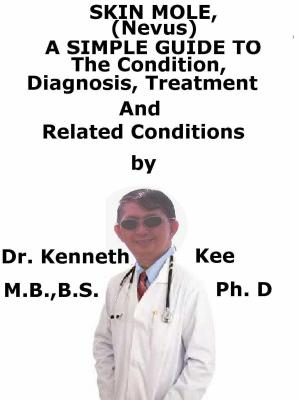Sulfur Deficiency, A Simple Guide To The Condition, Treatment And Related Conditions
Nonfiction, Health & Well Being, Medical, Alternative & Holistic Medicine, Diet Therapy, Patient Care, Nutrition| Author: | Kenneth Kee | ISBN: | 9781370370238 |
| Publisher: | Kenneth Kee | Publication: | October 20, 2016 |
| Imprint: | Smashwords Edition | Language: | English |
| Author: | Kenneth Kee |
| ISBN: | 9781370370238 |
| Publisher: | Kenneth Kee |
| Publication: | October 20, 2016 |
| Imprint: | Smashwords Edition |
| Language: | English |
Sulfur is the third most abundant mineral in the body after calcium and phosphorous.
It's an important mineral element that you get almost wholly through dietary proteins such as meat and fish and legumes.
Sulfur is a mineral in the body that is needed for:
1. Enzyme activity,
2. Hormone balance,
3. Function of the immune system.
4. It is an important component of collagen and connective tissues that assists the body in preventing inflammation and facilitating connective tissue repair.
5. It is very useful for healing skin and digestive problems.
In removing fluids and toxins, sulfur affects the cell membrane.
Sulfur is present in all cells and forms sulfate compounds with sodium, potassium, magnesium, and selenium.
Organic sulfur in addition to eliminating heavy metals regenerates, repairs and rebuilds all the cells in the body.
Important dietary sources of sulfur and sulfur containing compounds may be classified as essential mineral (e.g. elemental sulfur), essential amino acid (methionine) and semi-essential amino acid (e.g. cysteine).
Methionine cannot be synthesized by humans and cysteine synthesis requires a steady supply of sulfur present in protein amino acids present in meat and fish.
Sulfur deficiency causes age-related problems such as skin disease, joint pains, poor digestion.
Treatment is by sulfur supplements such as Dimethyl sulfoxide and Methylsulfonylmethane or in sulfur rich foods such as eggs, meat, poultry, fish, garlic, brussels sprouts.
TABLE OF CONTENT
Introduction
Chapter 1 Sulfur Deficiency
Chapter 2 Interesting Facts about Sulfur Deficiency
Chapter 3 Treatment of Sulfur Deficiency
Chapter 4 Psoriasis
Chapter 5 Alzheimer Disease
Chapter 6 Diabetes Mellitus
Chapter 7 Metabolic Syndrome
Chapter 8 High Cholesterol
Epilogue
Sulfur is the third most abundant mineral in the body after calcium and phosphorous.
It's an important mineral element that you get almost wholly through dietary proteins such as meat and fish and legumes.
Sulfur is a mineral in the body that is needed for:
1. Enzyme activity,
2. Hormone balance,
3. Function of the immune system.
4. It is an important component of collagen and connective tissues that assists the body in preventing inflammation and facilitating connective tissue repair.
5. It is very useful for healing skin and digestive problems.
In removing fluids and toxins, sulfur affects the cell membrane.
Sulfur is present in all cells and forms sulfate compounds with sodium, potassium, magnesium, and selenium.
Organic sulfur in addition to eliminating heavy metals regenerates, repairs and rebuilds all the cells in the body.
Important dietary sources of sulfur and sulfur containing compounds may be classified as essential mineral (e.g. elemental sulfur), essential amino acid (methionine) and semi-essential amino acid (e.g. cysteine).
Methionine cannot be synthesized by humans and cysteine synthesis requires a steady supply of sulfur present in protein amino acids present in meat and fish.
Sulfur deficiency causes age-related problems such as skin disease, joint pains, poor digestion.
Treatment is by sulfur supplements such as Dimethyl sulfoxide and Methylsulfonylmethane or in sulfur rich foods such as eggs, meat, poultry, fish, garlic, brussels sprouts.
TABLE OF CONTENT
Introduction
Chapter 1 Sulfur Deficiency
Chapter 2 Interesting Facts about Sulfur Deficiency
Chapter 3 Treatment of Sulfur Deficiency
Chapter 4 Psoriasis
Chapter 5 Alzheimer Disease
Chapter 6 Diabetes Mellitus
Chapter 7 Metabolic Syndrome
Chapter 8 High Cholesterol
Epilogue















